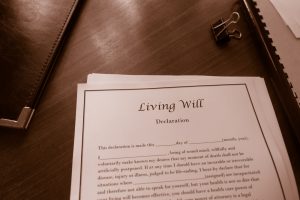Most people already know that their last will and testament is the cornerstone of their financial and estate plan. However, many consumers don’t have this critical document in place. A 2014 American Journal of Preventive Medicine study found that up to three-quarters of Americans don’t even have a health care proxy, an advanced directive or a living will. 
That’s in addition to only 42% of the population having a will. A well thought out will is one of the most important preparations to put in place as you age, but there are other estate planning and end of life documents that should be considered.
Your unique situation will determine which of these strategies and tools is most important for you and sitting down with an estate planning lawyer is one way to identify what will work for you as well as what you need to protect your best interests. These documents include:
- A living will
- Health care proxy or power of attorney for health care
- DNR – DNI orders
- Durable power of attorney
- Organ donor designation
- Diminishing capacity letters
- Life insurance
- Digital assets memorandum
- Personal property memorandum
- Relevant information collection
Make sure that when you spend all of the time to put together necessary documents to protect your assets and to articulate your end of life wishes, that you provide information for your loved ones or at least your attorney to access this. In a heat of the moment and in the midst of a crisis, it can be challenging for your loved ones to figure out where you have stored such information, but an experienced attorney can be one method for protecting your interests and your rights.
